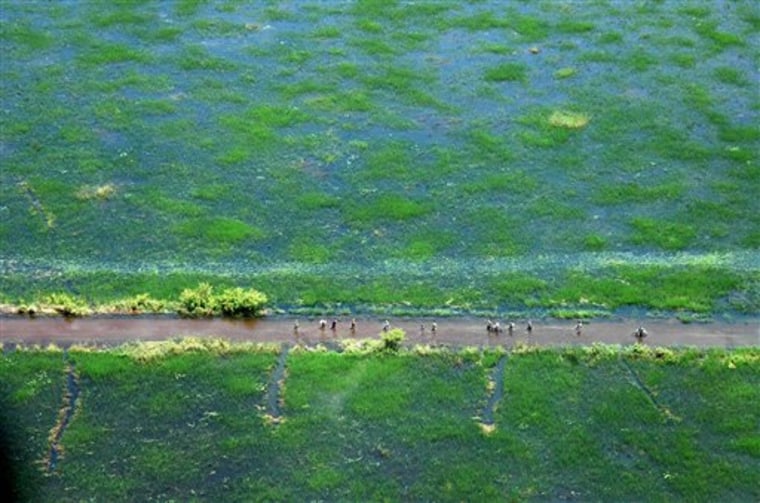The heaviest rains to hit Uganda in decades are washing away Santa Ayaa's seeds of peace.
Last year's truce between Lord's Resistance Army rebels and Ugandan government troops largely calmed years of fighting that sent Ayaa fleeing her village. She grew confident enough that she wouldn't have to run again that she planted peanuts and potatoes near the Latanya relief camp where she lives.
But now, she and others displaced by the conflict are among the hardest hit by the downpours, which have destroyed homes, roads and bridges across the nation. The rains began in July and have become Uganda's worst flooding in 35 years.
These days, Santa Ayaa's crops lie rotting in the ground.
"Peace made a big difference to us," said Ayaa, a 39-year old mother of nine. "But now we don't have enough once more."
This month the U.N.'s World Food Program began its first-ever airdrop operation in Uganda — using an an Antonov-12 cargo plane to deliver cereals, seeds, beans, sugar and a high-nutrition corn-soya blend.
300,000 hit by floods
So far 204,000 of the 300,000 people affected by the floods have received food by land, water and air. Tens of thousands remain unreachable. Many, like Ayaa, are those who had been displaced by the conflict, one of Africa's longest, in the nation of 30 million.
The Lord's Resistance Army, a northern-based rebel group that claims to be inspired by the Biblical Ten Commandments, is estimated to have abducted 25,000 children during its 20-year anti-government insurgency.
At the conflict's peaks, some 2 million Ugandans were forced from their homes.
"We have really been suffering," says David Komakech, a 31-year-old father of five who has been living for four years in the Latanya camp, in far northern Uganda.
"So many times we have gone to bed hungry in these past weeks. We have had to eat rotten cassava but even that has been finished now."
"We had begun to start thinking of restarting our lives but the rain has taken us back to the time before there was peace," he told The Associated Press.
While air drops offer a vital lifeline for the flood-affected people of north and east Uganda, they are costly and officials at WFP say they are facing a critical funding shortfall.
$15 million sought
According to Tesema Negash, the country director in Uganda, $15 million is urgently needed to continue offering relief to flood victims in the country until they are able to re-plant and harvest their own crops once again.
"If we don't receive this money we will have to suspend our relief operations to flood-affected victims," said Negash. "Malnutrition will set in. Children, women and the elderly will really start to suffer."
Only after Uganda's rural residents return to their countryside homes and harvest a season's crops can they begin to end their reliance on charity. Schools can reopen, communities can rebuild — and the youth can find occupations that make them less susceptible to rebel recruiters.
At the Latanya camp following a U.N. delivery, Ayaa gazed at the neatly stacked sacks of food aid that have been deposited near the camp. Women sifted through the millet, and men and children clawed at the ground trying to gather up the seeds and beans spilling from split sacks.
"At least now we are very sure that for some good time we will have something to cook," she said, shaking her head. "But our food security has been really affected — and we just don't know what the future holds."
